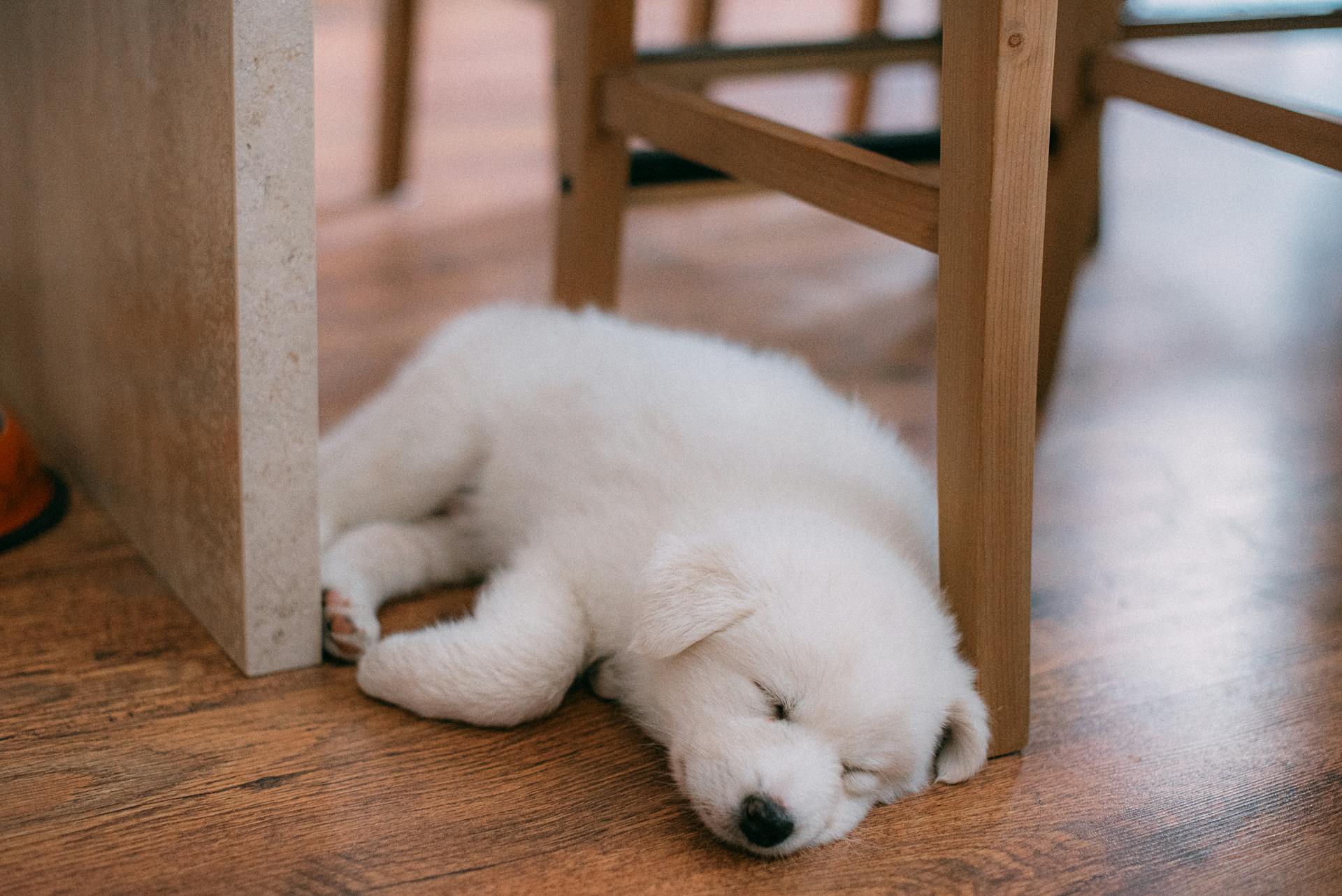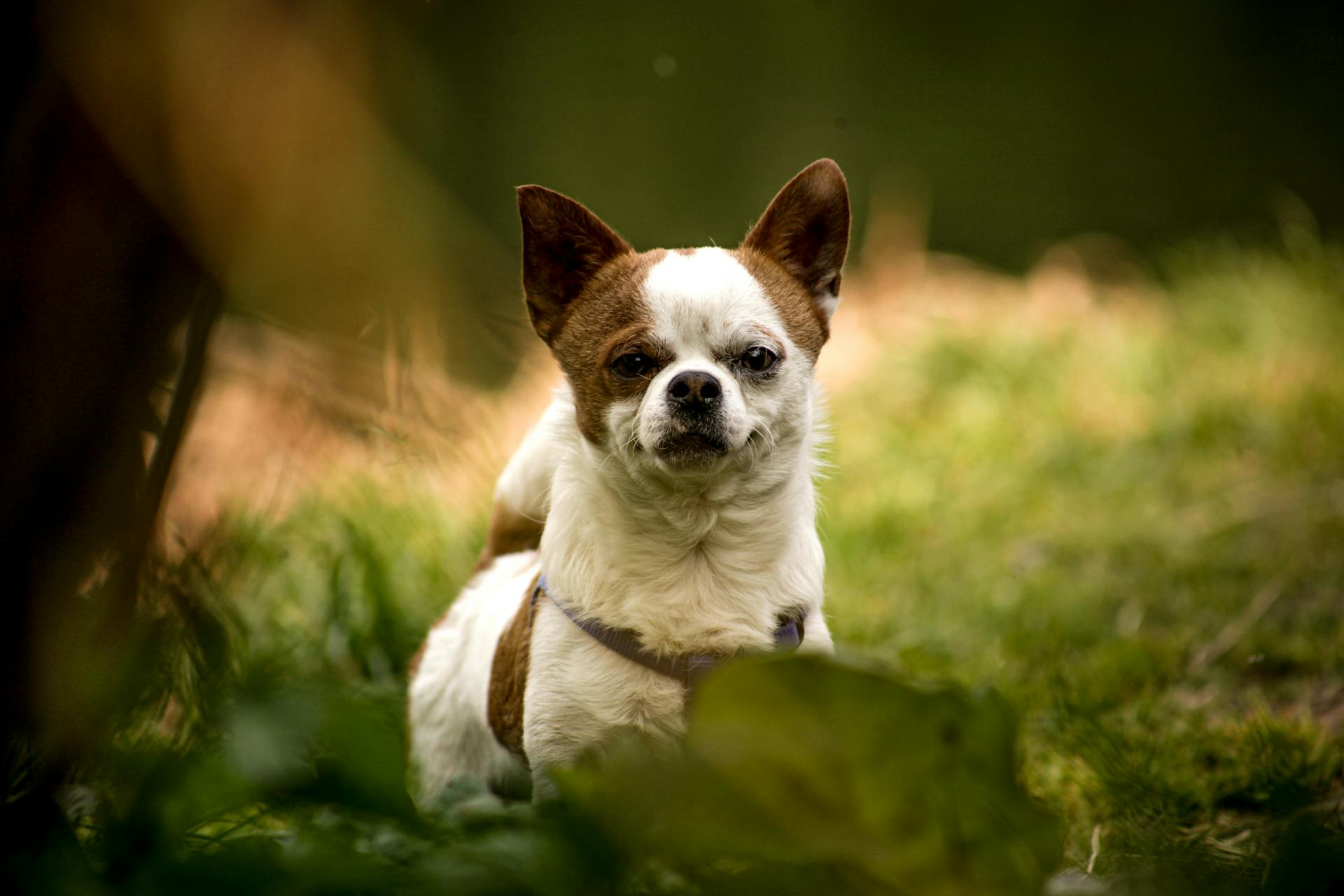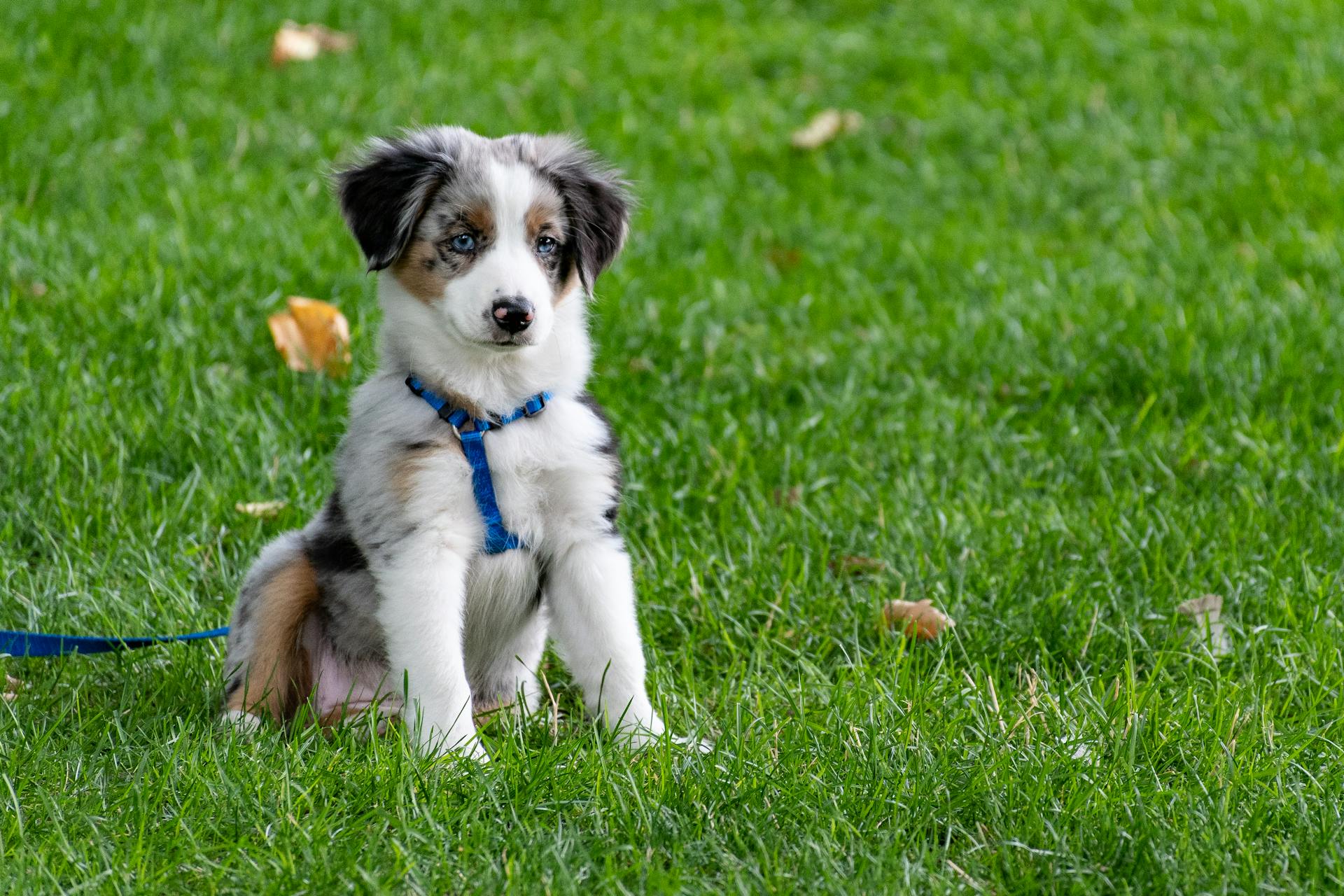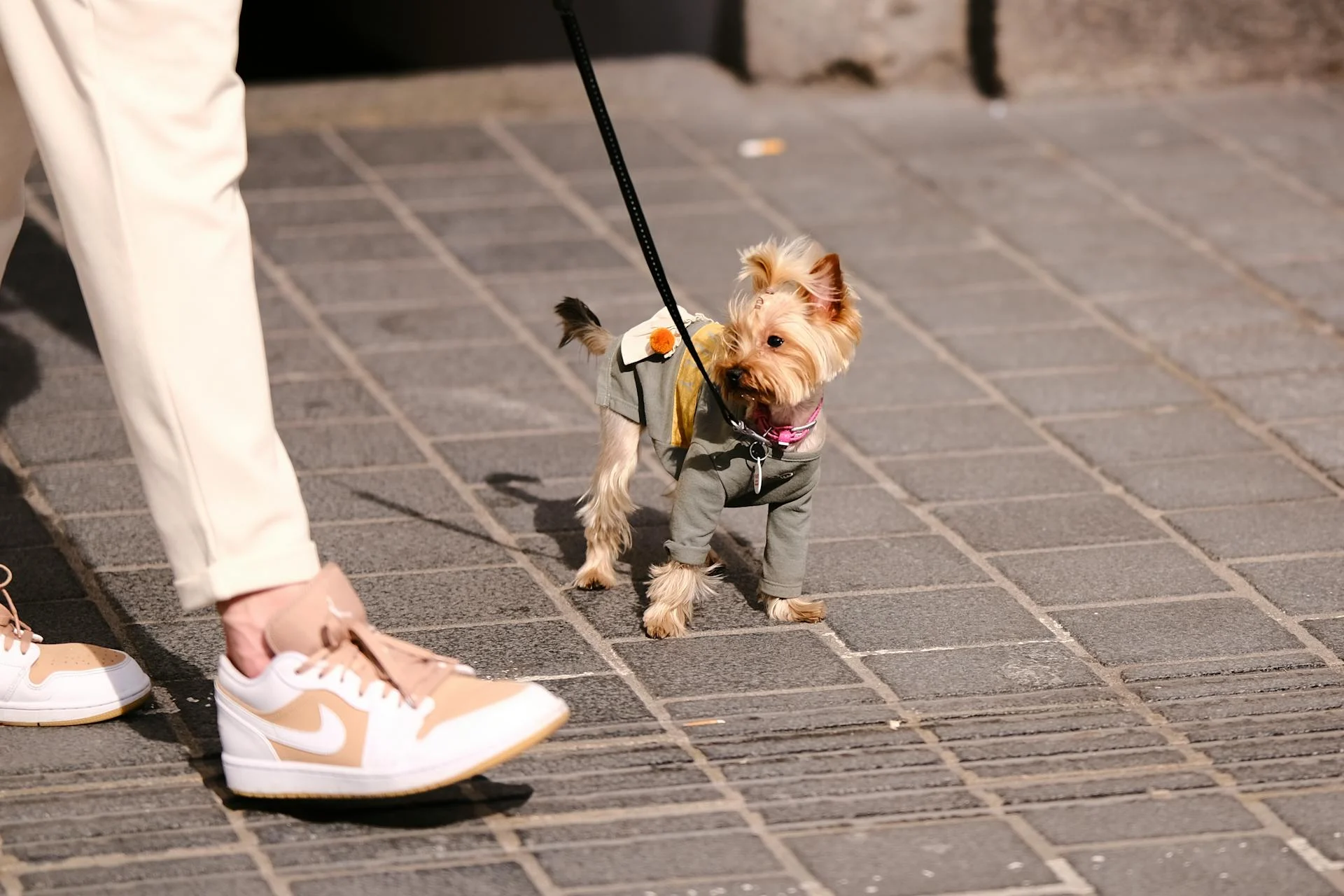
The Yorkie Poo is a crossbreed dog that combines the Yorkshire Terrier and the Poodle, typically creating a small, affectionate companion.
This adorable mix results from breeding a Toy or Miniature Poodle with a Yorkshire Terrier, producing offspring that inherit the best traits of both parent breeds.
Worth a look: Yorkie vs Yorkshire Terrier
What to Feed
Feeding your Yorkiepoo the proper type and amount of dog food helps maintain a healthy weight.
Yorkiepoos require early positive reinforcement training to minimize behavioral issues such as excessive barking and separation anxiety.
It's crucial to remember that Yorkiepoos are active, energetic dogs that need frequent exercise and mental stimulation to remain happy and healthy.
Commercial dog food made by reputable brands like Hill's Science Diet, Purina Pro Plan, Royal Canin, Iams, and Eukanuba is recommended for your Yorkiepoo.
Feed your Yorkiepoo twice each day, once in the morning and once at night, as this schedule helps maintain their blood sugar levels.
Explore further: Food for Yorkie Poo
Health and Wellness
Yorkiepoos can inherit health issues from their parent breeds, making genetic testing a good idea to decrease the danger of inheriting particular diseases.
A nutritious diet and routine vet visits can help avoid or manage some of these health problems. Consult a veterinarian for proper guidance on health management and prevention strategies.
Some common health conditions in Yorkiepoos include epilepsy, patellar luxation, Legg-Calve-Perthes disease, hypothyroidism, hyperadrenocorticism (Addison's Disease), atopic dermatitis, portosystemic shunt, Cushing's disease, inflammatory bowel disease, periodontal disease, and patellar luxation.
Here are some key health issues to be aware of:
- Epilepsy: mild to severe seizures
- Patellar Luxation: dislocation of the kneecap
- Legg-Calve-Perthes Disease: hip joint condition with decreased blood supply
- Hypothyroidism: disorder of the thyroid gland
- Hyperadrenocorticism (Addison's Disease): insufficient adrenal hormone production
- Atopic Dermatitis: inherited skin ailment causing allergic reactions
- Portosystemic Shunt (PSS): abnormal flow of blood between the liver and the body
- Cushing's disease: potential life-threatening condition affecting the adrenal glands
- Inflammatory Bowel Disease: irritation of the gastrointestinal tract
- Periodontal disease
Diet Requirements
Yorkie Poos are small and energetic dogs that need high-quality dog food tailored to their age, weight, and activity level. They require a specific feeding schedule to maintain their overall health.
Start by buying commercial dog food from reputable brands like Hill's Science Diet, Purina Pro Plan, Royal Canin, Iams, or Eukanuba. These manufacturers create fixed formulation foods that ensure each bag is consistent with previous batches.
Feed your Yorkie Poo twice a day, once in the morning and once at night, to maintain their blood sugar levels. It's also essential to choose food approved by the Association of American Feed Control Officials (AAFCO).
If you're unsure about how much to feed your Yorkie Poo or have concerns about their weight, speak with your veterinarian for personalized advice. They can help you determine the right amount and frequency of feeding based on your dog's individual needs.
Yorkie poo puppies under one year old need a more frequent feeding schedule: three to four times a day on a consistent schedule to prevent hypoglycemia.
Readers also liked: Yorkie Poo Feeding Chart
Health Issues
As you consider bringing a Yorkiepoo into your family, it's essential to be aware of the potential health issues that can affect this lovable breed.
Yorkiepoos inherit health issues from their parent breeds, and genetic testing can decrease the danger of inheriting particular diseases. A nutritious diet and routine vet visits can also help avoid or manage some of these health problems.
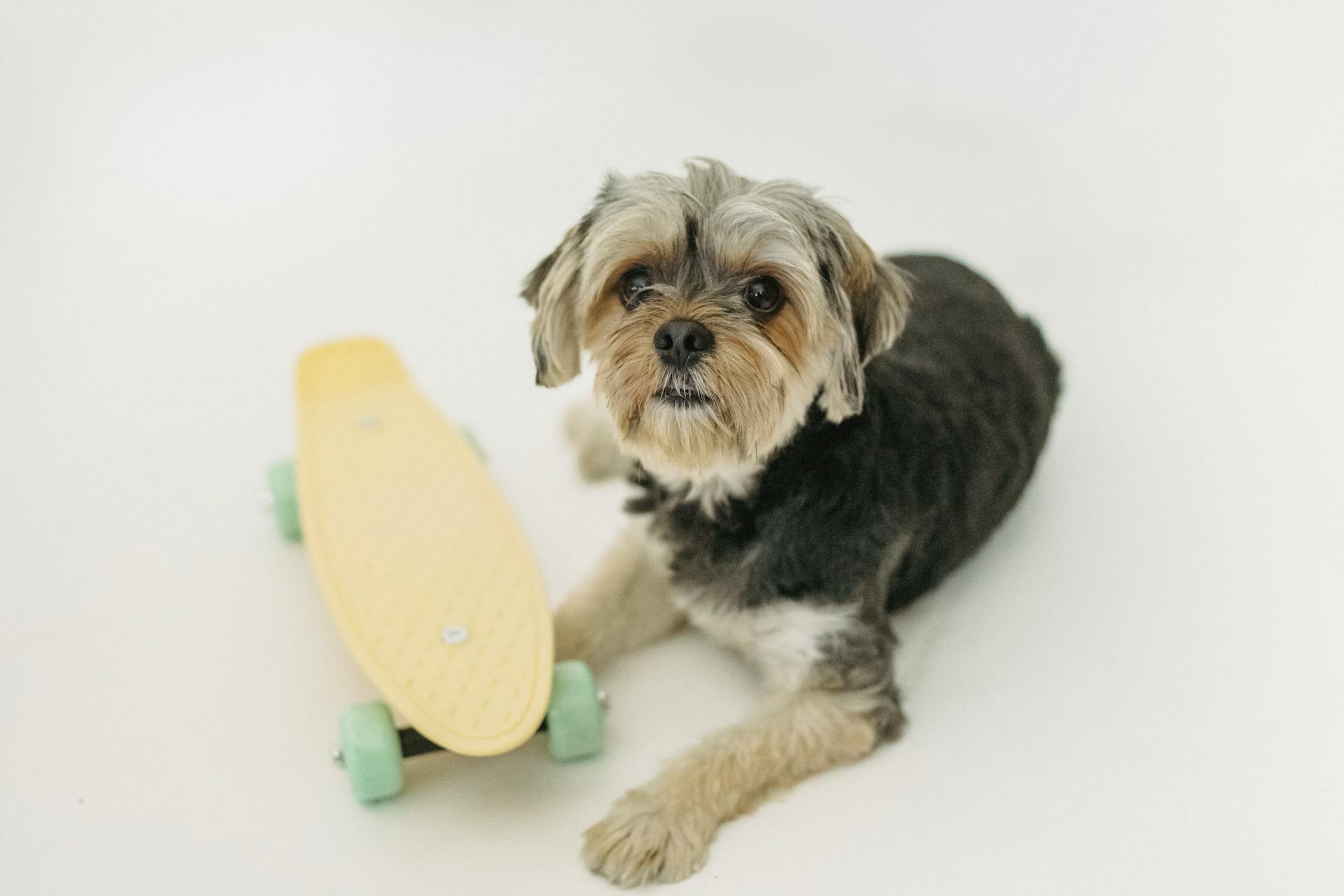
Some common health issues in Yorkiepoos include epilepsy, which can cause mild to severe seizures, and patellar luxation, a condition where the kneecap dislocates, causing discomfort.
Here are some specific health conditions that can affect Yorkiepoos:
- Epilepsy: This neurological condition can cause mild to severe seizures.
- Patellar Luxation: A dislocation of the kneecap, which can be debilitating but many dogs lead normal lives with this condition.
- Legg-Calve-Perthes Disease: A hip joint condition that can result in surgery for pain relief.
- Hypothyroidism: A disorder of the thyroid gland that may manifest as epilepsy, hair loss, obesity, and skin issues.
- Hyperadrenocorticism (Addison’s Disease): A serious condition arising from insufficient adrenal hormone production, leading to vomiting, poor appetite, and lethargy.
- Atopic Dermatitis: An inherited skin ailment causing allergic reactions to common substances, resulting in itching, redness, and hair loss.
- Portosystemic Shunt (PSS): A malformation of the vessels between the liver and the heart, which can lead to neurobehavioral abnormalities, lack of appetite, hypoglycemia, intermittent gastrointestinal issues, urinary tract problems, drug intolerance, and stunted growth.
Early detection and proper treatment are crucial for managing these health conditions. Regular check-ups with a veterinarian and a healthy lifestyle can go a long way in keeping your Yorkiepoo happy and healthy.
Drooling Level
Yorkies are known for being low droolers, unlike some larger breeds that can be quite slobbery.
One notable exception is the Yorkie poo, which isn't known for excessive drooling like its larger counterparts.
Dog Bred for Low Allergy
The Yorkie Poo is a dog breed that was developed for its hypoallergenic coat.
This means that they are designed to produce less dander and shed less than other breeds, making them a great option for people with allergies. The Yorkie Poo was initially developed as a mixed breed or "designer dog" specifically for this reason.
Intriguing read: Bich Poo Breed
Training and Behavior
Yorkiepoos are small dogs with big personalities and can be quite stubborn at times.
To prevent excess barking, keep your Yorkiepoo mentally stimulated and train him from an early age. Consistency is key, as they might require a bit more effort to train than other breeds.
These pups adore spending time with their families, so it's best not to leave them home alone for too long, or they may develop separation anxiety and exhibit negative behavior like constant barking.
Yorkiepoos are highly trainable due to their intelligence and eagerness to please. They respond well to positive reinforcement training using healthy treats and praise.
Consistency, patience, and a tough but kind attitude are essential when teaching a Yorkiepoo new behaviors. Socialization and obedience training are also crucial for them to develop into well-behaved canines.
These dogs are known for learning quickly, which makes them both easy to train and challenging to keep up with. They're high-energy socialites who love interacting with their humans and strangers, making every time spent with them a good one.
Explore further: How to Train a Shih Poo
Grooming and Appearance
The Yorkiepoo's grooming regimen is a must for pet parents. Regular brushing and washing are essential to prevent matting and tangling.
Their coat displays a delightful range from straight to curly, offering luxurious softness and silkiness. Each Yorkiepoo may differ, but those resulting from multigenerational breeding are often described as odorless and nonshedding.
Maintaining their fine coat demands diligent care, including regular daily brushing to prevent tangles and matting. Gently brush hair away from the eyes to prevent irritation, and occasional trimming with scissors can safeguard eye health.
Ear Care
Keeping your Yorkiepoo's ears clean is critical to preventing infections.
You should clean their ears around once a week with a cleaner approved for dogs and use clean cotton balls or wipes, not swabs. This simple task can make all the difference in keeping your furry friend healthy and happy.
Shedding and Grooming
The Yorkiepoo's coat is a true delight, with its luxurious softness and silkiness that's simply heavenly to touch.
You can expect a wavy, low-shed coat from your Yorkiepoo, which requires regular grooming to maintain its silky texture. Some owners recommend brushing them daily, but trimming their fur short may not require such frequency.
Regular brushing is essential to prevent tangles and matting in the Yorkiepoo's fine coat, so make sure to brush hair away from their eyes to prevent irritation. Occasional trimming with scissors can also safeguard eye health.
The Yorkiepoo does produce minimal dander, making it a great choice for owners with allergies. However, complete nonshedding is a bit of a myth, as all dogs experience some shedding.
Maintaining your Yorkiepoo's coat requires regular nail trimming to prevent discomfort and complications – ideally monthly if you're new to it, seek guidance from a professional.
Living Needs
Yorkie poos are generally adaptable and not fussy about living arrangements, but they still require dedicated time to meet their energy needs.
They can thrive in a variety of environments, whether it's a suburban backyard or an urban dog park. In fact, Yorkie-poos would make great apartment dogs if you're comfortable with that lifestyle.
It's essential to invest in proper booties and winter coats to help them manage cold weather walkies. This will ensure their comfort and safety during the colder months.
Yorkie poos have a prey drive, which means they might inherit an instinct to chase small creatures, so it's crucial to establish better control over the environment through good training and playtime in proper fenced areas.
Leash training is also vital, especially if your Yorkie-poo will be around larger dogs in public areas, for their safety. Remember, this playful pooch often thinks she's bigger than she is!
On a similar theme: Yorkshire Terrier Crate Training
Personality and Temperament
The Yorkiepoo is a playful and energetic breed that requires light physical activity and mental stimulation. They can thrive in apartment living due to their petite stature.
To ensure they bond with other dogs and pets, proper training and socialization are crucial. With young children, it's essential to supervise interactions to avoid unintentional harm.
Highlights
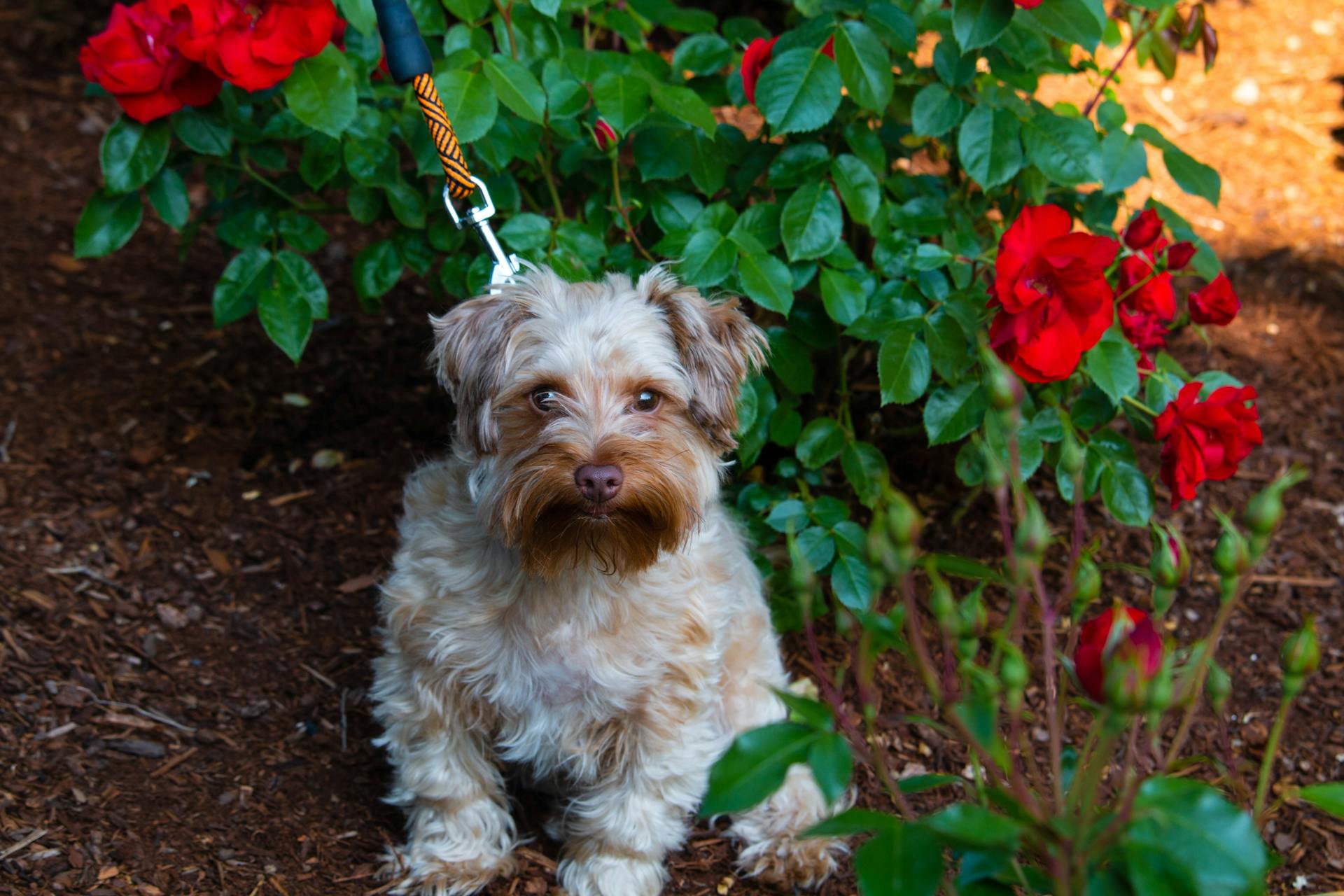
The Yorkipoo's personality is a delightful mix of its Poodle and Yorkshire Terrier ancestors. Energetic and lively, this breed thrives on daily exercise and enjoys outdoor activities.
One of the most endearing traits of the Yorkipoo is its gentle nature, making it an excellent companion for older children who can appreciate its loving side. However, interactions with very young kids should be monitored to ensure everyone's safety.
The Yorkipoo is a non- to low-shedding breed, which makes it a great choice for families with allergy sufferers. To keep their fine, silky coat looking its best, regular brushing is essential.
This intelligent breed responds well to positive reinforcement training, but may exhibit occasional stubbornness that requires patience and consistency. With the right approach, your Yorkipoo can learn to be a well-behaved and loyal companion.
Here are some key traits of the Yorkipoo's personality:
- Alert watchdog: The Yorkipoo has a tendency to bark frequently, making it an attentive watchdog.
- Loyal companion: This breed forms strong bonds with its owners and may experience separation anxiety if left alone for extended periods.
By understanding the Yorkipoo's personality and temperament, you can better prepare yourself for the joys and challenges of owning one.
Temperament & Intelligence
The Yorkiepoo temperament is truly one-of-a-kind, overflowing with personality, affection, curiosity, and a smidgen of bossiness!
They're lively and spunky dogs that thrive on mental and physical stimulation, requiring consistent training and socialization from an early age. Early positive reinforcement training can help curb the pesky Yorkiepoo trait of barking excessively.
These small but spirited dogs are easy to train and have a genuine fondness for being with their people, making them delightful companions. They're watchful by nature and often find contentment in observing the world from their owner's lap.
Yorkiepoos get along well with youngsters in general, but young children should be watched when playing with them due to their small size to avoid unintentional harm. Meeting at least one parent, usually the mother, and observing interactions with other relatives can help gauge the potential personality of the puppy.
Early socialization is crucial for the Yorkiepoo's development, ensuring a well-rounded adulthood through exposure to diverse environments, people, and experiences. With proper training, socialization, and boundaries, these dogs can grow into adaptable and loving companions that thrive in human companionship.
Related reading: Small Yorkie Dog
Self-Perception
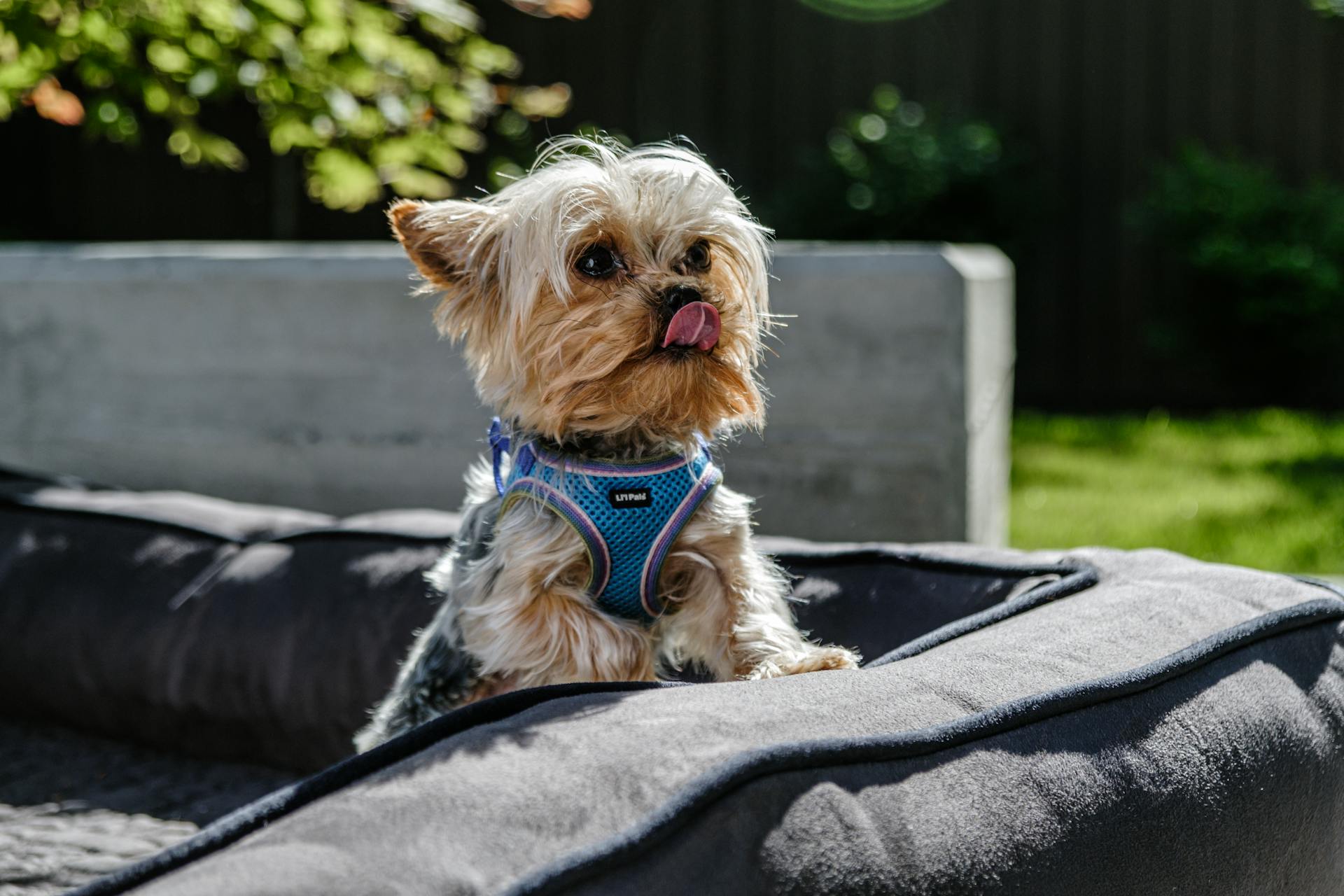
Some people might think that knowing your breed mix is a key part of self-perception.
You can expect a Yorkie poo to be compact and not exceed 14 inches in height.
This physical characteristic is often a result of breeding a Yorkshire terrier with a poodle.
In terms of lifespan, you can count on a typical Yorkie poo living for around 12 to 15 years.
This age range gives them plenty of time to remain active and playful well into adulthood.
Their size may be small, but their spirit is big - Yorkie poos are known to stay lively even as they get older.
Pets Covered
Protecting your furry friends' health is a top priority.
Even the healthiest pups can come with unexpected vet costs, which can be a financial burden if not planned for. Pet insurance can help keep your dog and your bank account happy.
Yorkie Poo breeds can live up to 15 years, and during that time, they may experience trips to the vet due to inherited minor issues or major health concerns affecting their organs.
These breeds are prone to inflammatory bowel disease, among other potential health issues. Investing in dog insurance can save you thousands of dollars over your pet's lifetime.
Pet insurance is a smart investment for any dog owner, as it provides financial protection against unexpected veterinary expenses.
Family and Socialization
The Yorkie Poo is a great addition to households with kids! They're gentle and affectionate companions who can form positive bonds with children.
However, it's essential to exercise caution with very young children due to their small size making them susceptible to mishandling. Older, more considerate kids can enjoy rewarding companionship with a Yorkie Poo.
A daily dose of exercise and consistent positive-reinforcement training will help prevent common quirks like excessive barking in your Yorkie Poo.
Dogs with Other Pets
The Yorkipoo is a gentle and affectionate companion who can form a positive bond with children, but it's advisable to exercise caution with very young children due to their small size.
When introducing your Yorkipoo to other pets, socialization is key. They generally get along well with other dogs, though there may be a size discrepancy that they don't fully recognize. Their Yorkshire Terrier side might lead to prey drive behavior, so it's best to keep them away from smaller animals unless they've been raised together and socialized well.
Recommended read: How Big Do Yorkie Poo Dogs Get
Children should learn not to approach a dog while eating or sleeping and to avoid attempting to take away a dog's food, ensuring safe and supervised interactions is crucial. Always supervise their encounters and guide them on approaching and touching dogs properly, preventing any unintentional actions that could provoke a negative response.
Yorkie poos aren't known for being aggressive towards other dogs, but patience is required as they may need time to adjust. They will get along sooner than you think if socialized well, so don't be discouraged if it takes some time.
Rescue Groups
If you're considering bringing a Yorkipoo into your family, it's essential to think about their socialization needs. Many Yorkipoos are acquired without a full grasp of the responsibilities that come with ownership.
Numerous Yorkipoos are seeking adoption or foster care because they were not properly cared for initially. This can be heartbreaking, but it also presents an opportunity for you to provide a loving home to a deserving dog.
You may be able to adopt your own Yorkipoo through rescue groups like Poo-Mix Rescue, Save A Yorkie Rescue, or Yorkie Rescue of America. These organizations work tirelessly to find forever homes for dogs in need.
If you're ready to open your heart and home to a lovable Yorkipoo, consider reaching out to these rescue groups to learn more about the adoption process.
Check this out: Yorkiepoo Rescue
Frequently Asked Questions
Are Yorkiepoo good dogs?
Yorkiepoos are known for being intelligent, spirited, and loving companions. They make great family dogs and vibrant additions to any household.
What are the downsides of a Yorkipoo?
Yorkipoo downsides include potential injuries from roughhousing with children or dogs due to their small size
Are Yorkie poos high maintenance?
No, Yorkiepoos are relatively low-maintenance dogs. They require minimal grooming and training efforts, making them a great choice for first-time dog owners.
What is the life expectancy of a Yorkiepoo?
A Yorkiepoo's average life expectancy is 12-15 years. They remain active and playful well into adulthood.
What is a Yorkie Poodle mix called?
A Yorkie Poodle mix is commonly known as a Yorkipoo. This hybrid breed combines the characteristics of Yorkshire Terriers and Toy or Miniature Poodles.
Featured Images: pexels.com
